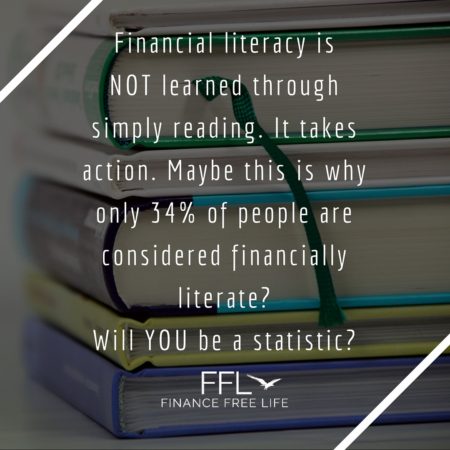What You Should Know About Financial Literacy
Financial literacy is a fairly stable and consistent set of acumen and wording. There have been some additions and subtractions from normal financial needs, but most have remained consistent. If it has been around for awhile, why do so many still struggle with their money? The simple truth, no one had ever taught them the basics.
Why You Need To Be Educated On Finances
In a recent poll, approximately only 34% of Americans are financially literate. This means about two-thirds of the nation has almost no knowledge of the basics of money! This is very scary. Especially when you think about all of the people you currently know who might have generous paying jobs. Having a high-paying job does not mean you are smart with money. In some cases, more money does indeed equal more problems. This also means there are those who are in the financial field (i.e. bankers, loan officers, etc.) who may not always know how to manage their own money. The caveat here is, they DO know how to use the right lingo to talk speak to the 66% who trust these representatives. They know how to talk, “educate“, and sell the “best” products for you. If you are not educating yourself, you may be relying too heavily on others who won’t always have your best interest at heart.
Crash course
The Verbiage and Acumen
The banking world is vast and is constantly changing with new products, but the verbiage behind the products remains similar. The biggest products banks are going to try and get you to purchase or sign for are loans and credit cards.
- Monthly Income: This is the GROSS income (before tax) of all the income you receive in a month. In some cases, you will have to provide support for the income. Thus, if you are going to claim it, you are going to want to be able to supply a paystub, contract, or other document showing consistent payment.
- Monthly Expenses: These are the expenses which are supplied to your credit bureau. If you have loans, credit cards, collections, etc, it would be best to disclose prior to an application. Most bankers are good at what they do (I was), and they are going to the quick calculations to see if an application was even worth it for you/them. If it isn’t advantageous for the customer, I never ran the bureau to check to see if they could qualify. You shouldn’t either. Every time you run a credit pull it hurts your score. Check out more here.
- Debt to Income (DTI): Your debt to income is very easy to calculate. Take your monthly expenses and divide by your monthly gross income. Depending on what you are applying for will determine what the acceptable range is going to be. For example, most current mortgage lenders require you to have a 43% or less to be qualified for the loan.
- Demand Deposit Account (DDA): This is simply a checking account. It will typically not be interest bearing (you don’t accrue interest).
- Certificate of Deposit (CD): This is a savings account which gets a significantly higher interest rate on deposited funds. However, you are required to lock it in for a set time frame. If you withdraw prior to the expiration date, you will be hit with a huge fee and lose much of the interest accrued.
Working Knowledge
Following Finance Free Life for any period of time should expose you to a significant amount of knowledge needed for financial success. Much of the working knowledge you need primarily revolves around having a budget and knowing where your money is going every month. Having an emergency fund is another big part of having financial understanding and wisdom. Having this fund setup displays the need to plan ahead for the unforeseen and not relying on cleaning out your life savings or maxing out a credit card.
Thinking about the future also reflects financial intellect. Having a retirement account or some form of 401K setup through your work is a great start. Understanding how it works is even better. One of the last key items is having a contingency plan if you are suddenly without a job. In these cases, you would most likely have a reserve funds set up for six months of expenses. This way you can live off of this savings while you look for a new job.
There is so much more to learn about finances! It is a part of the world we live in, and it is not going away. Keep learning and growing! Do not be among the 66%!

